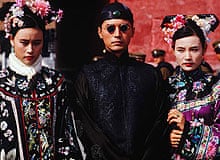Director: Bernardo Bertolucci
Entertainment grade: C+
History grade: C–
Puyi became emperor of China two months before his third birthday in 1908. Following the 1911 revolution, a republic was declared and he abdicated. The tumultuous political history of China from that point on defined Puyi's life. He was made emperor of the Japanese puppet state of Manchukuo in the 1930s, captured by the Red Army in 1945, "re-educated" by Mao Zedong's administration, and finally persecuted during the Cultural Revolution.
Childhood

The film is weighed down by a lengthy opening section on Puyi's childhood which, though it is weird enough to merit some interest, basically consists of a lot of kowtowing eunuchs in the Forbidden City doing their best to spoil a small child. The film doesn't show the half of it. As Puyi himself wrote in his autobiography, "by the age of 11, flogging a eunuch was a part of my daily routine." Most of us, of course, can only make time for that once or twice a week. Peter O'Toole, as Puyi's tutor, Reginald Johnston, does his best to liven things up, though if you're hoping to see him drop-kick the imperial brat through the Gate of Supreme Harmony you will be disappointed. The director also elbows in a theme of sexual discovery, beginning with Puyi's fixation on his wet nurse and ending with him as a teenager romping around under the sheets with a giggling empress and secondary consort. Evidence that the real last emperor had any sexual interest in women is scant at best: Puyi himself repeatedly wrote that his five consorts were wives "in name only". This doesn't mean he was gay – though, inevitably, there were rumours – but it does mean the film's romantic plots have no basis in reality.
Family

After they get evicted from the Forbidden City, things don't go too well for the royals. The ex-emperor becomes a playboy, later having to admit to the chief of his labour camp that he would buy anything western, "especially Wrigley's chewing gum, Bayer aspirin, and cars." Correct, and almost a direct quote from the real Puyi's memoir. Puyi's secondary consort demands a divorce from her gum-chewing, aspirin-guzzling husband, to which he responds passive-aggressively by refusing to look up from his newspaper. It's not long before she flees, leaving Puyi to console himself with Eastern Jewel, an urbane leather-clad cross-dressing spy princess. Improbable-sounding, yes, but she really did exist. Sidelined, the empress is so bored that she is reduced to eating the floral displays at her husband's coronation as emperor of Manchukuo, before moving on to the more diverting pastimes of opium addiction (true) and recreational lesbianism (extremely speculative). Dramatic as all this is, there remains the glaring problem that Puyi wasn't romantically involved with women; and, furthermore, that he wasn't a bit like the tragic hero shown here. During his reign in Manchukuo, the real Puyi lost his marbles, and became obsessed with consulting oracles, injecting himself, and beating servants (in one case, to death) for trivial offences.
Politics

Bertolucci's movie was made with the blessing of the Chinese government, which gave him permission to film in the Forbidden City, so you would probably not expect a searing full-frontal critique of Chinese political history. However, The Last Emperor is by no means a propaganda job. It's notably balanced on the many regimes it covers, and there's a particularly effective scene in which a loyal communist teacher from Puyi's labour camp is for no obvious reason declared an enemy of the Cultural Revolution. Furthermore, the evident parallels between the formality and structure of the imperial court, and the formality and structure of Maoist China, make a subtle but striking point. The style of authoritarianism might change, but the substance does not.
Verdict
It's not bad on the political history of China, but Puyi's personal life was a lot nastier than The Last Emperor lets on.
